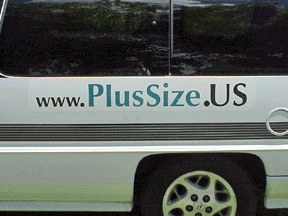|
other major
industrial powers (like Great
Britain's .co.uk and Germany's
.de) have. The primary factor
that put .us behind the 8-ball was the
fact that the extension was reserved for
government use until April 2002.
By the time it was opened up to all
Americans (and foreign companies with a
U.S. business presence) .com
had already become the default choice
for U.S. companies.
|
At
this stage, I don't think
anything is going to change
that, but I am seeing more signs
that .us is finally starting to
find an audience, especially in
the small to medium sized
business |
|

Ad
on the Neustar (.us registry)
website |
market.
In the seven years since the
extension was opened up, the
Internet has experienced a
phenomenal growth spurt. The
number of .coms registered today
is 15 times greater than
it was back then. As a result,
virtually every meaningful
keyword, phrase or short acronym
you can imagine is long gone in
.com. That has forced many new
businesses, especially those
with limited budgets (which is
just about all of them given the
current economy), to consider
alternatives. |
Since the
vast majority of businesses have a local
focus, .us is the obvious second choice
for many of them and I am seeing that
manifested more and more often in the
real world. While watching the Tampa
Bay Rays play the Florida Marlins
on TV Sunday, one of the big signs on
the outfield wall was for TampaBay.us,
a domain being used by the Tampa Bay
Partnership, a highly respected
regional organization focused on
stimulating economic growth and economic
development in the Tampa Bay area. They
had no chance to get TampaBay.com
because that was taken long ago by the St.
Petersburg Times
newspaper.
|
A
couple of weeks ago when I
pulled up to the departures gate
at the Tampa airport to head to
the Domain
Roundtable
conference in Washington,
D.C. I noticed a big web
address on the back of the
remote parking shuttle bus in
front of me - A1Express.us.
On my last trip to Chicago
I noticed another airport
shuttle company with the URL AirportExpress.us
emblazoned on their vehicles.
.Com became the 800-pound
gorilla because .com addresses
have always been plastered everywhere
you look. By comparison,
spotting high visibility .us
names is still like spotting a
rare bird in the wild, but
sightings are becoming more
frequent and that bodes well for
the extension. |

|
A larger
sampling of .us usage in the business
community can be seen by doing a Google
search using this string:
site:.us company -state -k12 -cc -ci
-co -lib -pdf -pippin
That produces results that, for the most
part, are limited to business pages at
sites using the .us extension (the
-state, -k12, etc. filters throw out the
many government, school and
non-commercial sites that use .us so
names used in commerce are spotlighted).
The search returns over 5.5 million
pages today. If you use the same string
for the two global alternate extensions
that were released at about the same
time .us was (replacing site:.us with
site:.info and site:.biz), the results
are considerably lower; 3.8 million
for .info and just under 3.5
million for .biz.
|

|
If
you throw the extra word filters
out all together and just use
site:.us, site:.info and
site:.biz to see all pages
for a given extension in Google,
regardless of how they are used,
the .us sites still win with 295
million indexed pages vs. 224
million for .info and only 72
million for .biz. I have not
previously bookmarked these
numbers to see how they have
changed over time, but now that
I've done so, will revisit them
periodically in the future to
see what kind of growth we are
seeing by this measure.
If
the old axiom that a rising
tide lifts all boats is
true, then the global boom in
ccTLDs should give the .us an
additional boost too. In market
share it will continue to
|
|
be
.com's baby brother but there is
nothing wrong with being a
profitable niche in any industry
and .us is showing signs that it
is growing into that role. |
One
other note today, and this is a sad one.
Khalid, a popular domainer and
member of Britain's AcornDomains
forum, who was known to many
by his user names JeeWhizz and Pixelcraze,
passed away Thursday morning. A forum
post said he had recently undergone
surgery. Khalid is survived by wife Emma
and a 1-year-old baby daughter Abigail.
Khalid was also an administrator
at a general business forum, A1BusinessForums.co.uk,
that also announced his passing.
|